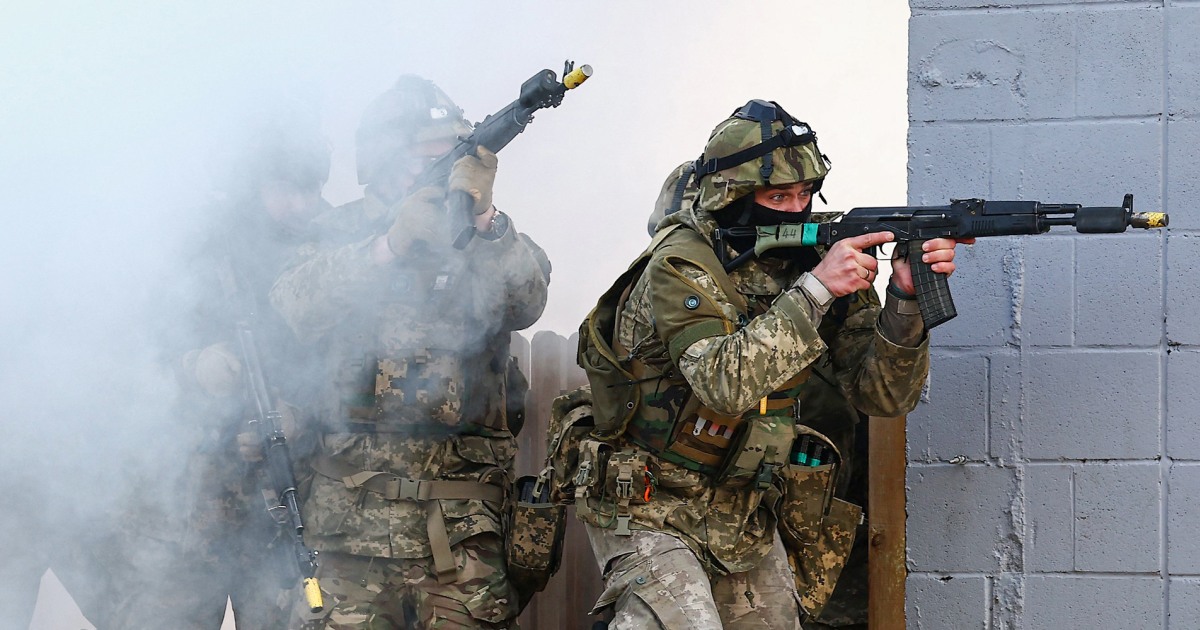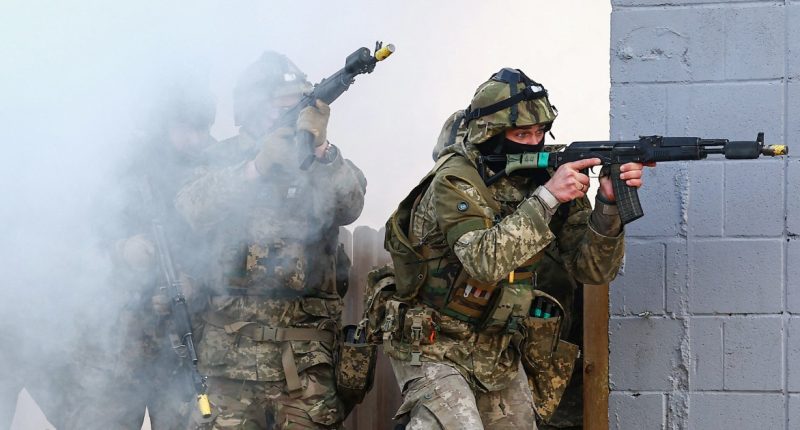
WASHINGTON — After voting to avert a government shutdown Friday, the House left town for its two-week Easter recess without passing critical military aid for Ukraine as the war-torn nation runs dangerously low on ammunition in its fight against the Russian invasion.
Speaker Mike Johnson, R-La., said he wanted to finish funding the government before shifting his attention to foreign aid for a trio of U.S. allies: Ukraine, Israel and Taiwan. And he has rebuffed calls from other leaders to put the $95 billion Senate-passed aid package on the House floor, saying he is drafting his own Ukraine package.
But it means that the lower chamber won’t address funding for Kyiv until mid-April — at the earliest. And Johnson has given few hints as to how he might construct his supplemental aid package, though he maintains it is a priority.
“There’s a number of avenues that we’ve been looking at to address that,” Johnson told reporters this week, adding that funding the U.S. government needed to come first. “And having done that now, we’ll turn our attention to it and we won’t delay.”
Ukrainian President Volodymyr Zelenskyy has said his country can’t afford any further delays. He’s told congressional leaders that, without additional aid from the U.S., Ukraine could lose its two-year war against Russia. On Friday, U.S. officials condemned Russia’s “brutal” overnight attack on Ukrainian cities and civilian targets, described as the “largest series of air strikes Russia has launched against Ukraine’s energy grid since the start of this war.”
For months, the debate over sending Ukraine a fresh round of aid has vexed the divided government in Washington. President Joe Biden, along with the two Senate leaders — Majority Leader Chuck Schumer, D-N.Y., and Minority Leader Mitch McConnell, R-Ky. — have been exerting pressure on Johnson to quickly take up the Senate bill that includes $60 billion for Ukraine.
But five months on the job, Johnson has had to tread carefully on the issue. Former President Donald Trump, the presumptive GOP presidential nominee this fall, has lashed out at the Senate package, and far-right Trump ally Rep. Marjorie Taylor Greene, R-Ga., had threatened to force a vote to oust the speaker, warning that linking Ukraine funding and border security was her “red line.” On Friday, Greene filed a so-called motion to vacate over her opposition to the government spending package, giving her the option to quickly force the vote next month if she doesn’t like Johnson’s strategy on Ukraine.
Other House conservatives have demanded that Congress secure the southern border before sending any more aid to Ukraine while rejecting a bipartisan deal by senators that included provisions aimed at amping up border security.
“If I were calling the shots, I’d say we’re gonna secure the border; we’re not getting another dollar for Ukraine,” said GOP Rep. Chip Roy, a member of the conservative Freedom Caucus who represents the border state of Texas.
A range of options
U.S. officials estimated that by late March Ukraine’s military could face disastrous supply and ammunition shortages. It was a message reinforced to lawmakers who attended the Munich Security Conference and traveled to Ukraine last month.
However, Johnson is keeping his cards close to the vest. He hasn’t specified whether the Ukraine aid would be a stand-alone bill — separated from the Israel and Taiwan aid — or if it would be attached to border security provisions demanded by his right flank.
The speaker has instructed working groups to use the two-week break to flesh out the plethora of options on a foreign aid package raised by numerous members, an official familiar with Johnson’s thinking told NBC News. There are many ideas on the table; some are more popular in the conference than others.
Johnson has said he’s open to an idea — first floated by Trump — that would treat nonmilitary aid for Ukraine as a loan to be repaid. Another idea on Johnson’s radar is a bill by Foreign Affairs Chairman Mike McCaul, R-Texas, the REPO for Ukrainians Act, that would seize assets of Russian oligarchs and use proceeds to pay for the Ukrainian war effort. The Democratic-led Senate Foreign Relations Committee passed a version of that bill, but top Democrats are hesitant to move it as a stand-alone measure until the House takes up foreign funding.
Other options include additional sanctions on Russia, forcing the Biden administration to reverse course on liquefied natural gas exports and border enforcement provisions.
“There are a lot of ideas being talked about” and nothing’s been settled, said Majority Leader Steve Scalise, a Louisiana Republican like Johnson, who controls the floor schedule. “We’re looking at what we can do to address the border security problem first and then helping our friends around the world.”
This week, Russian President Vladimir Putin secured another six years in power after he claimed victory in an election with no real opposition. House Democrats, who along with bipartisan Senate leaders have been urging Johnson to put the Senate-passed bill on the floor, bashed GOP leaders for punting the Ukraine issue until after the long recess. Rep. Greg Meeks of New York, the top Democrat on the Foreign Affairs panel and its former chairman, said it’s a dereliction of duty for the GOP-led House to head home for its spring break without aiding its ally.
“Ukraine is close to being completely out of ammunition. … They’re making choices now of giving up territory because they don’t have enough ammunition to fight, and then decide to go someplace else to utilize and conserve what they have,” Meeks said in an interview just off the House floor.
If Congress funds Ukraine and “we do keep it up, Putin’s aggression will be stopped,” Meeks said. “If we don’t, Putin’s aggression will continue — not only in Ukraine but in other parts of Europe.”
Johnson gets an earful
Because of the desperate situation on the ground and the House’s foot-dragging, the White House has had to act unilaterally. The Pentagon rushed $300 million in lethal assistance earlier this month after finding cost savings in contracts. But without more resources from the entity in control of the nation’s checkbook, U.S. military readiness could suffer, top Defense Department officials warned.
Johnson has been briefed in secure settings and understands that the situation in Ukraine is important and timely but does not rise to the level of imminent military collapse, a source close to the speaker said. He also accepts that a sizable chunk of the funds appropriated to fund Ukraine’s military would be used to replenish U.S. stockpiles, the source added.
Desperate to unlock aid, some top Democrats indicated they would consider the eleventh-hour ideas being raised by House Republicans, but most prefer that the lower chamber put the Senate-passed package on the floor, which they say would pass overwhelmingly.
Even those who said the proposals could be worth discussing, including Democratic Caucus Chair Pete Aguilar of California, concluded that it was a “bad idea.” And it’s not even clear that a loan-based approach on nonlethal assistance to Ukraine could be enforceable, in the words of Sen. Dick Durbin, D-Ill., who said it was his understanding that it would be a “waivable” loan.
“The only viable path forward is for House Republicans to take the national security bipartisan and comprehensive bill that was sent over by the Senate weeks ago and put it on the House floor for an up-or-down vote,” House Minority Leader Hakeem Jeffries, D-N.Y., said Thursday. “House Republicans need to stop bending the knee to the pro-Putin faction that is growing and ascendant in their party. … The Senate bill is bipartisan, it’s comprehensive and it’s the only viable way forward.”
It’s not only Democrats who are giving Johnson an earful about the urgent need for the Senate-passed bill. McConnell on Wednesday reiterated his calls for Johnson to put the package on the floor.
“What I’ve said repeatedly is we’re running out of time and the best way to get Ukraine the help they need is for the House to pass the Senate bill. The problem with changing it, as you all know, it can take three days to do the simplest thing here in the Senate. We don’t have the time,” McConnell said during his weekly leadership news conference.
“So, I’m continuing to advocate to the speaker that he put the bill on the floor and let people vote,” he said.
In the meantime, House Democrats are circulating a discharge petition to force the Senate-passed bill to the floor, bypassing Johnson and GOP leaders. The petition requires 218 signatures, which would need to include a handful of Republicans to trigger a vote; Democrats have just 188 signatures. Separately, Reps. Brian Fitzpatrick, R-Pa., and Jared Golden, D-Maine, are collecting signatures for their own bipartisan discharge petition that would fund Ukraine, Israel and Taiwan while incorporating some border enforcement provisions. It has just 16 supporters so far.
On Thursday, Rep. Ken Buck, R-Colo., signed onto both discharge petitions, one of his final acts before resigning from Congress on Friday. His signature will remain on the petitions until his seat is filled.
Rep. Don Bacon, R-Neb., a co-sponsor of the slimmed-down bipartisan Ukraine bill, said McCaul is working closely with GOP leadership to modify their legislation to make it more palatable.
“All I ask is make sure it’s bipartisan and bicameral,” Bacon said.
Source: | This article originally belongs to Nbcnews.com










